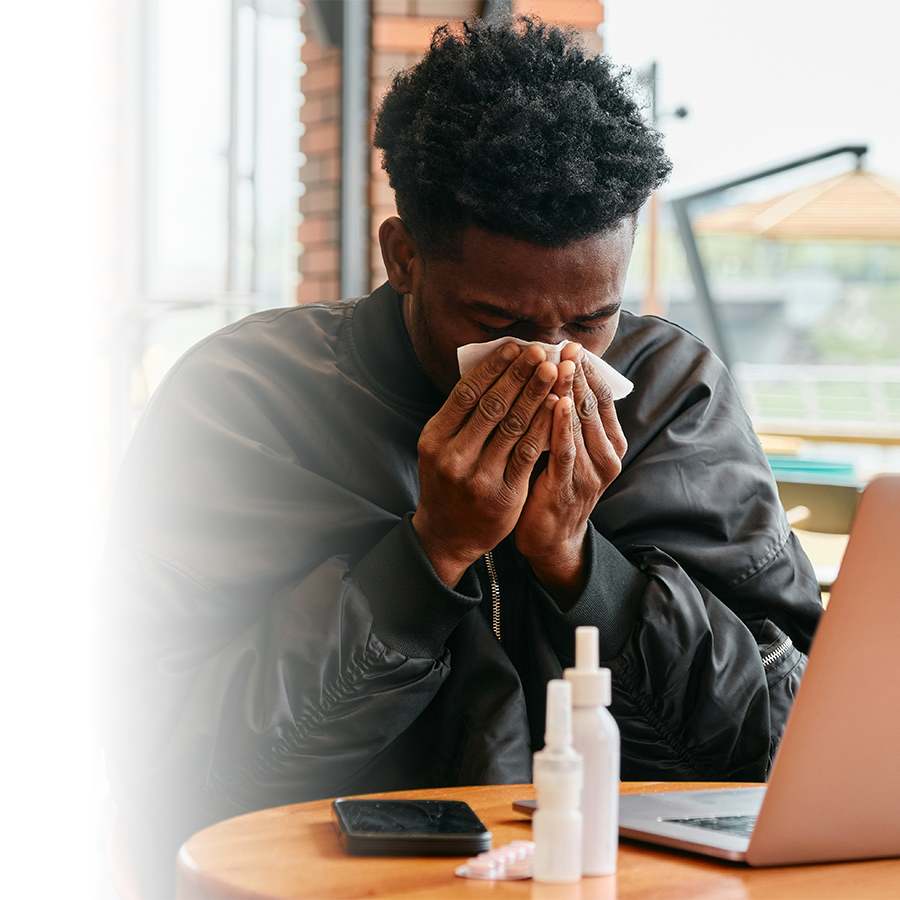Do you have runny, itchy eyes and nose, and a tendency to sneeze? It's not always easy to tell if it's a cold or a seasonal allergy, especially in the middle of spring! Here is some useful information to help you distinguish between the two.
Cold: A common viral infection
Who can say they've never had a cold in their life? Whatever our age or health condition, it's hard to escape it. Not surprising, since the common cold (also known as rhinopharyngitis) is caused by viruses that are easily transmitted. Fortunately, this widespread health problem usually has no serious consequences. Although benign in most cases, this infection can nevertheless compromise your well-being and daily activities, at least for a few days.
Typical cold symptoms include:
- Nasal congestion;
- Runny nose;
- Sneezing;
- Cough (dry or wet);
- Sore throat;
- Transient fever (less common).
How can I relieve a cold?
Having a cold often means you have to be patient. Since it's a viral infection, you have to wait until your immune system is able to defend you against it. It usually takes 7 to 10 days to recover.
Unlike bacterial infections, which can be treated with antibiotics, the common cold cannot be relieved with a specific treatment. Depending on your pharmacist's recommendations, you may be able to relieve your symptoms with certain over-the-counter medications adapted to your health condition, for example:
- Decongestant;
- Antihistamine;
- Saline solution;
- Cough suppressant;
- Analgesic;
- Lozenges.
Seasonal allergies: Similar symptoms but different causes
An allergy is the body's reaction to an external agent to which it is particularly sensitive (allergen). To defend itself against this "threat," the body triggers a series of reactions, including the release of a substance called histamine, responsible for the signs and symptoms of allergy.
Seasonal allergy, allergic rhinitis, hay fever: Are they all the same?
The term "allergic rhinitis" or "hay fever" is sometimes used to refer to seasonal allergies.
The term rhinitis refers to inflammation of the nasal passages. When you're allergic to a substance, it's often your nose that suffers the consequences. The result is congestion, often a very runny nose, sneezing and itching. These characteristic allergy symptoms are therefore common to those of the common cold, which partly explains why it's easy to confuse them.
Seasonal allergies, commonly referred to as “hay fever,” are historically associated with the haying season (in other words, warm weather!).
In addition to congestion, runny nose, itching and sneezing, a seasonal allergy can be recognized by these signs:
- Tearing or runny eyes;
- Red eyes or swollen eyelids;
- Itchy eyes, palate, throat or ears.
An increasingly common condition
There has been a gradual increase in cases of seasonal allergies/hay fever in recent years. In fact, it is estimated that over 20% of the population aged 15 and over will experience symptoms of pollen allergy at some time during the year. Such an increase in cases can be explained by the impact of climate change on vegetation.
Did you know?
Seasonal allergies affect women more than men, and younger people more than older people.
Is it possible to have a cold and an allergy at the same time?
Yes, it is possible to have a cold and an allergy at the same time. The common cold, of viral origin, and allergies, triggered by immune reactions, can coexist, making symptoms more intense and treatment more complex. In such cases, it may be necessary to take medications specific to each condition in order to effectively manage this co-occurrence. Consult a healthcare professional to be sure!
How can you tell the difference between a cold and allergies?
Here are the right questions to ask yourself to determine whether your symptoms are those of a cold or a seasonal allergy!
What season is it?
Colds are most common in fall and winter, while seasonal allergies run from the arrival of spring to the first frost in the fall. Of course, it's possible to have a cold in the middle of summer, but it's generally less frequent.
Has anyone around me had the same symptoms?
The common cold is contagious, but seasonal allergies are not. So, if someone around you has symptoms similar to yours during the same period, chances are you have a cold.
How did my symptoms start and how are they evolving?
Cold symptoms often evolve gradually, varying in nature and intensity from day to day. Seasonal allergies arrive much more suddenly, with less variation.
What exactly are my symptoms?
You probably have a cold or other respiratory viral infection if your nasal symptoms are also accompanied by:
- Fever;
- Sore throat;
- Muscle pain;
- Headache;
- A severe cough;
- Thick, sticky or coloured secretions.
Seasonal allergies, on the other hand, are more often associated with a heavy, clear, liquid mucus discharge.
How long have my symptoms been going on?
If your symptoms have lasted more than 7 to 10 days, there's a good chance you have a seasonal allergy. In fact, allergy symptoms can last for several weeks, or even months in some cases.
Could my symptoms have another origin?
Absolutely! The symptoms of a cold or seasonal allergy can be experienced in the presence of many other conditions. What's more, although allergic rhinitis symptoms are generally caused by exposure to pollen, they can also be due to other allergens, such as:
- Animal hair or saliva;
- Dust mites;
- Mould;
- Chemical products.
Are you in doubt? Ask your pharmacist!
Whether you have a cold, an allergy or a combination of both, your pharmacist can help you by suggesting measures/treatments to relieve your symptoms, or by directing you to the right medical resource for help. In some cases, your pharmacist can even prescribe medication for your condition. So, don’t hesitate to ask them for advice.

